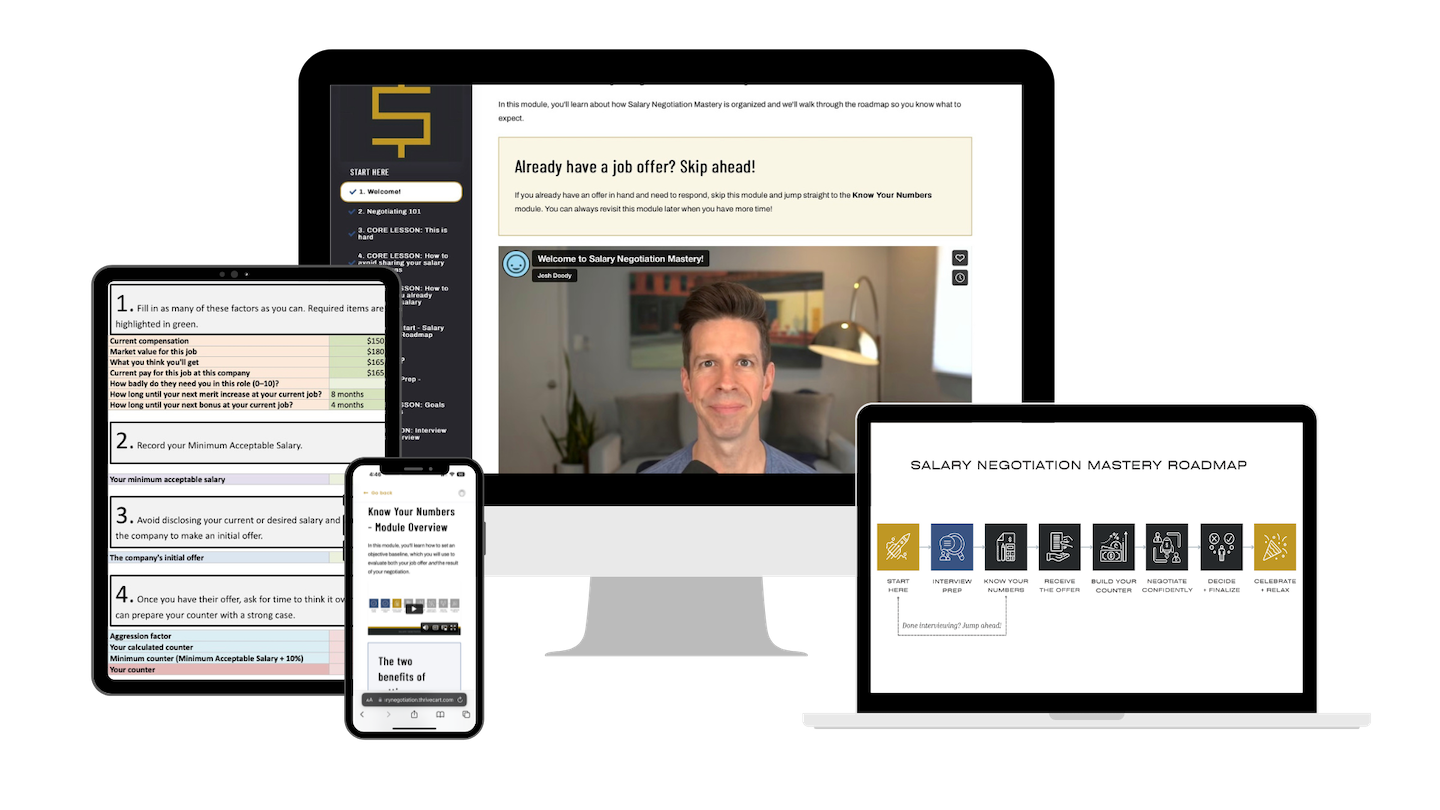Negotiating job offers
How to respond to a job offer over email (template and tips)
You have two main objectives: Buy some time and confirm your offer details
by Josh Doody
When you get a job offer, you’ll immediately experience a rollercoaster of emotions: relief, then excitement, then uncertainty, then stress, then maybe even dread.
You may go all the way from excited to get the offer to feeling immense pressure that you need to respond immediately. But you don’t have to respond immediately if you can effectively buy yourself some time to think.
That’s why your first move after you get an offer should be much simpler than you might expect: Buy some time.
Jump to…
- Respond to a job offer—email template
- Respond to a verbal job offer—script
- Respond to a job offer—video walkthrough
- Tips for when you first get a job offer
You do want to respond quickly, but you don’t want to commit to anything just yet. This email template is the best way to respond to a job offer (and I’ll also share a script you can use in case you get a verbal offer).
This email and the accompanying script are the very first things I give to every salary negotiation coaching client I work with—it’s that important.
Your job offer will probably be of the informal variety, and you’ll either be told the details in an email, or on a phone call with a hiring manager or recruiter.
Here’s how to respond to each type of job offer.
Respond to a job offer—email template
When you get the job offer via email, you can just respond to that email and ask for more time and confirm the details of your offer.
Here’s an email template you can use to reply to your job offer:
To: [Recruiter]
Subject: [Name of person who made the offer]’s verbal offer
Hi [Recruiter name]
Thank you so much for your job offer. Do you mind if I take a couple of days to consider your offer and discuss this opportunity with my family? And would you mind sending me a summary of the numbers you mentioned? I don't need anything formal—bullet points would be fine!
Thanks again for your offer, and I’ll get back to you soon!
[Your name]
Respond to a verbal job offer—script
Here’s what to say to get some time to consider your job offer when it’s shared over the phone:
Thank you so much for your job offer. Do you mind if I take a couple of days to consider your offer and discuss this opportunity with my family? And would you mind sending me a summary of the numbers you mentioned? I don’t need anything formal—bullet points would be fine!
They’ll almost certainly say, “Sure! I look forward to hearing what you think, and please let me know if you have any questions.”
And now you’ve moved the conversation off of the phone and into email.
Respond to a job offer—video walkthrough
Here’s a short video walkthrough with some other important insight into what to do next when you get a job offer:
This is a lesson from my Salary Negotiation Mastery program.
Tips for when you first get a job offer
Lastly, here are a few tips that will help you respond to your job offer and set yourself up for a successful salary negotiation.
1. Don’t share your salary expectations
You may schedule a call with your recruiter, anticipating a job offer. But instead, your recruiter may ask for your salary expectations.
This can be deflating (you were hoping for an offer and instead got a difficult question), but it can also be an opportunity to make a very costly mistake: sharing your salary expectations.
If they do ask you for your salary expectations, this article will help you answer that question well while also leaving your negotiation options open later on: Salary Expectations Questions - How should you answer them?
2. It’s totally normal to ask for some time to consider your job offer
Although you might feel a lot of pressure to respond and either accept or decline your offer immediately, your recruiter almost certainly expects you to take some time to consider your offer.
You don’t need much time—a day or two should be sufficient—but you do need some time to evaluate your offer, think about it, and build your negotiation strategy to make sure you optimize it before you decide whether to accept it.
3. When they ask you how you “feel” about the offer, use the scripts above
Sometimes, your recruiter will make you a job offer and immediately ask you how you “feel” about it. You are not obligated to tell them how you feel about the offer!
The scripts above are perfectly appropriate to respond when they ask you how you feel about the offer.
Articles you may also like
- How to negotiate salary: 9 tips from a pro salary negotiator
- Salary Negotiation Email: Proven template and walkthrough
- Should you negotiate your salary over email?
- How to accept a job offer over email (templates and examples)
- How to decline a job offer over email (templates and examples)
- The Anatomy of a Big Tech Job Offer: How Big Tech Structures Their Job Offers

